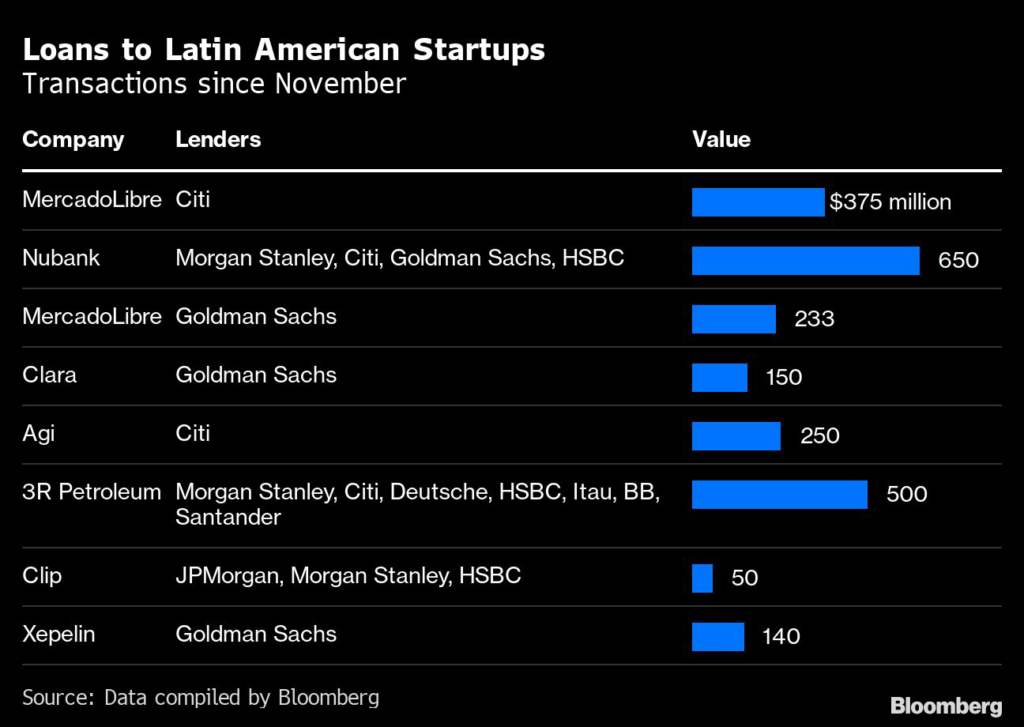Banks including Goldman Sachs Group Inc. and Citigroup Inc. are stepping in with loans as Latin American startups face shrinking public valuations that make equity sales less attractive.
(Bloomberg) — Banks including Goldman Sachs Group Inc. and Citigroup Inc. are stepping in with loans as Latin American startups face shrinking public valuations that make equity sales less attractive.
Small startups such as Brazilian fintech Agi, known previously as Banco Agibank SA, and Chile’s Xepelin Holdings SA, as well as bigger firms such as digital retailer MercadoLibre Inc. are among those receiving financing. More than $2.3 billion in loans have been made since November, with banks such as Morgan Stanley and JPMorgan Chase & Co. also participating, according to public data compiled by Bloomberg. Many transactions have been kept private.
“We’re not here just to take them public,” said Eduardo Cruz, Citigroup’s head of banking, capital markets and advisory for Latin America. “Because of our services and capabilities and our presence in so many countries, we actually can help these companies expand beyond their local markets.”
Latin America startups, which boomed in recent years with huge initial public offerings and record venture-capital investments, are suddenly facing a reckoning as rising interest rates around the world depress valuations and increase the cost of funding. Equity sales by Latin American companies fell 60% this year through Sept. 13, to $10.8 billion, according to data compiled by Bloomberg.
“It’s a new class of clients that has emerged in the last five years that we’re working closely with,” said Eduardo Miras, head of investment banking at Citigroup in Brazil. “We are helping companies that we believe are going to be the winners, that are going to grow and solidify. We can offer these tech companies not only investment-banking services and funding, but also payments and cash management.”
After being valued at $45 billion in a much-anticipated initial public offering in December and raising almost $2.8 billion, Nu Holdings Ltd., know as Nubank, has a market value about $25 billion now. In April, it took a $650 million credit line with a three-year maturity from banks including Citigroup, Goldman Sachs, HSBC Holdings Plc and Morgan Stanley for its expansion in Mexico and Colombia.
Citigroup’s loan book to Latin America corporations rose 12% to $36.2 billion in June from the end of 2021, according to the New York-based bank’s balance sheet.
Even companies that still received venture capital investments this year are taking the opportunity to get loans. Just four months after having raised $111 million in a private equity sale, Chilean fintech Xepelin got a $140 million loan from Goldman Sachs for its expansion in Mexico.
After the record of $15.8 billion last year, venture capital investments in startups in Latin America fell this year, according to LAVCA, the association for private equity investment in the region. In the first half of the year, it reached $5.44 billion, 41% less than in the last half of 2021.
Pedro Juliano, head of investment banking at JPMorgan in Brazil, said not all forms of financing are appropriate for startup companies.
“On one side, venture debt is good, because in theory it dilutes the shareholder less up-front,” Juliano said Wednesday at the Bloomberg Línea Summit in Brazil. “But it also usually uses warrants and has characteristics that can make it expensive, with a bigger dilution in the future.”
Rodrigo Catunda, co-head for Brazil at General Atlantic, said at the event that “venture debt is risky debt, and I would not use it as an aggressive strategy.”
Much of the lending coming to Latin America’s startups from US banks are asset-backed loans, which can reduce the cost of funding for companies and provide financing in local currency. Others are straightforward acquisition-finance deals, such as the $500 million loan taken by Brazil’s 3R Petroleum Oil & Gas SA to pay for the acquisition of the country’s Potiguar oil field.
Goldman Sachs sees value in “developing our relationships early with these companies since our intention is to grow alongside them,” said Samuel Villegas, president of Goldman Sachs Mexico Casa de Bolsa. “We believe some of these companies are changing the landscape of the financial and banking industries in Latin America.”
More stories like this are available on bloomberg.com
©2022 Bloomberg L.P.











